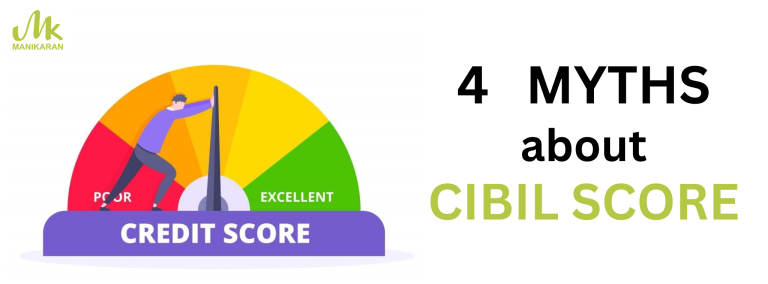Don't Be Fooled by These 4 Myths About Your CIBIL Score !
Your CIBIL score is one of the most important factors that lenders consider when evaluating your creditworthiness. Your score can determine whether you are eligible for a loan or credit card, and what interest rate you will pay. However, there are several myths and misconceptions surrounding CIBIL score that can mislead people into making poor financial decisions. In this blog post, we will debunk four common myths about CIBIL score so that you can make informed financial decisions.

1. Checking Your CIBIL Score Will Lower It.
Many people believe that checking their CIBIL score frequently will lower it. This is not true. In fact, checking your CIBIL score regularly is a good practice as it allows you to keep track of your creditworthiness and identify any errors in your credit report. When you check your CIBIL score, it is considered a “soft inquiry,” which does not have any impact on your score. Only “hard inquiries” made by lenders can have a temporary negative impact on your score.
2. A Low CIBIL Score Means You Will Never Get a Loan
Having a low CIBIL score does not mean that you will never be able to get a loan or credit card. While a low score can make it more difficult to get approved for credit, it is not the only factor that lenders consider. Other factors such as your income, employment history, and debt-to-income ratio are also important. Additionally, some lenders specialize in providing loans and credit cards to people with low CIBIL scores.
3. Closing Unused Credit Cards Will Improve Your CIBIL Score
Many people believe that closing unused credit cards can improve their CIBIL score. However, this is not necessarily true. In fact, closing a credit card can actually lower your score as it can increase your credit utilization ratio. Your credit utilization ratio is the percentage of your available credit that you are using. Closing a credit card can reduce your available credit, which can increase your credit utilization ratio and lower your score. If you want to improve your CIBIL score, it is better to keep your credit cards open and use them responsibly.
4. Paying Off Your Debts Will Immediately Improve Your CIBIL Score
While paying off your debts is important for improving your CIBIL score, it may not result in an immediate improvement. Your CIBIL score is calculated based on several factors, including your payment history, credit utilization, length of credit history, and types of credit. It takes time to build a good credit history and improve your score. Therefore, it is important to make consistent, on-time payments, and use credit responsibly over time.
In Conclusion,
your CIBIL score is an important aspect of your financial life, but there are several myths and misconceptions surrounding it. By understanding the facts and avoiding these myths, you can make informed financial decisions and improve your creditworthiness over time. Remember to check your CIBIL score regularly, use credit responsibly, and make consistent, on-time payments.

